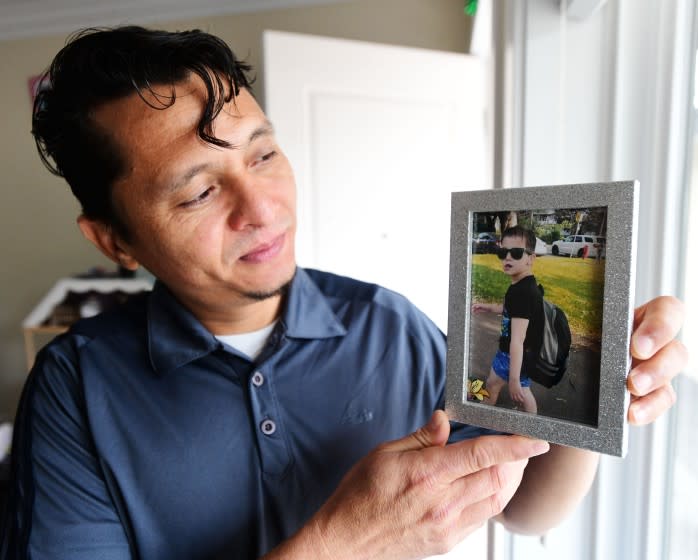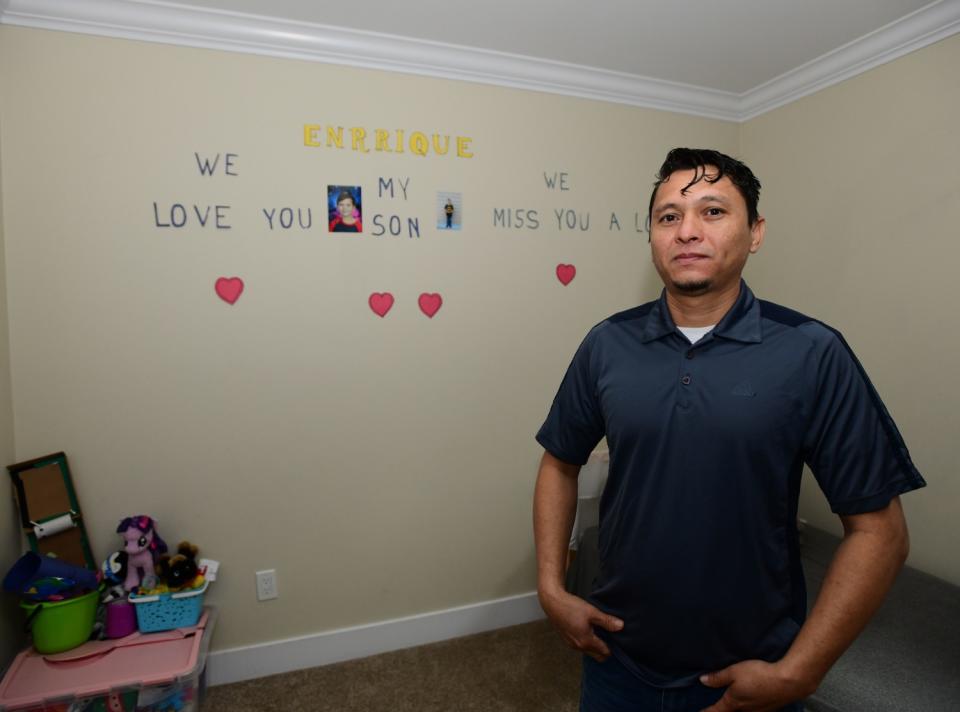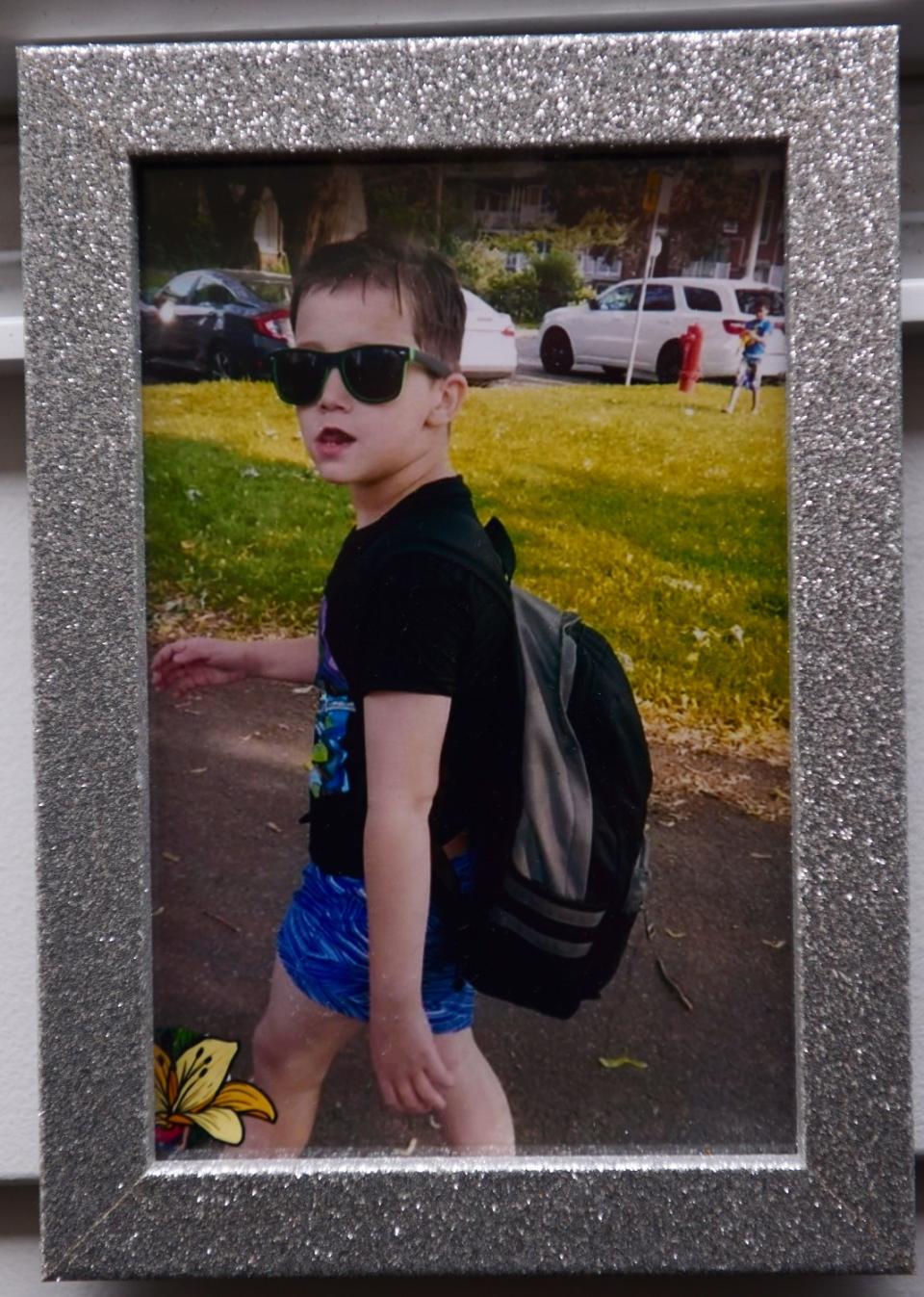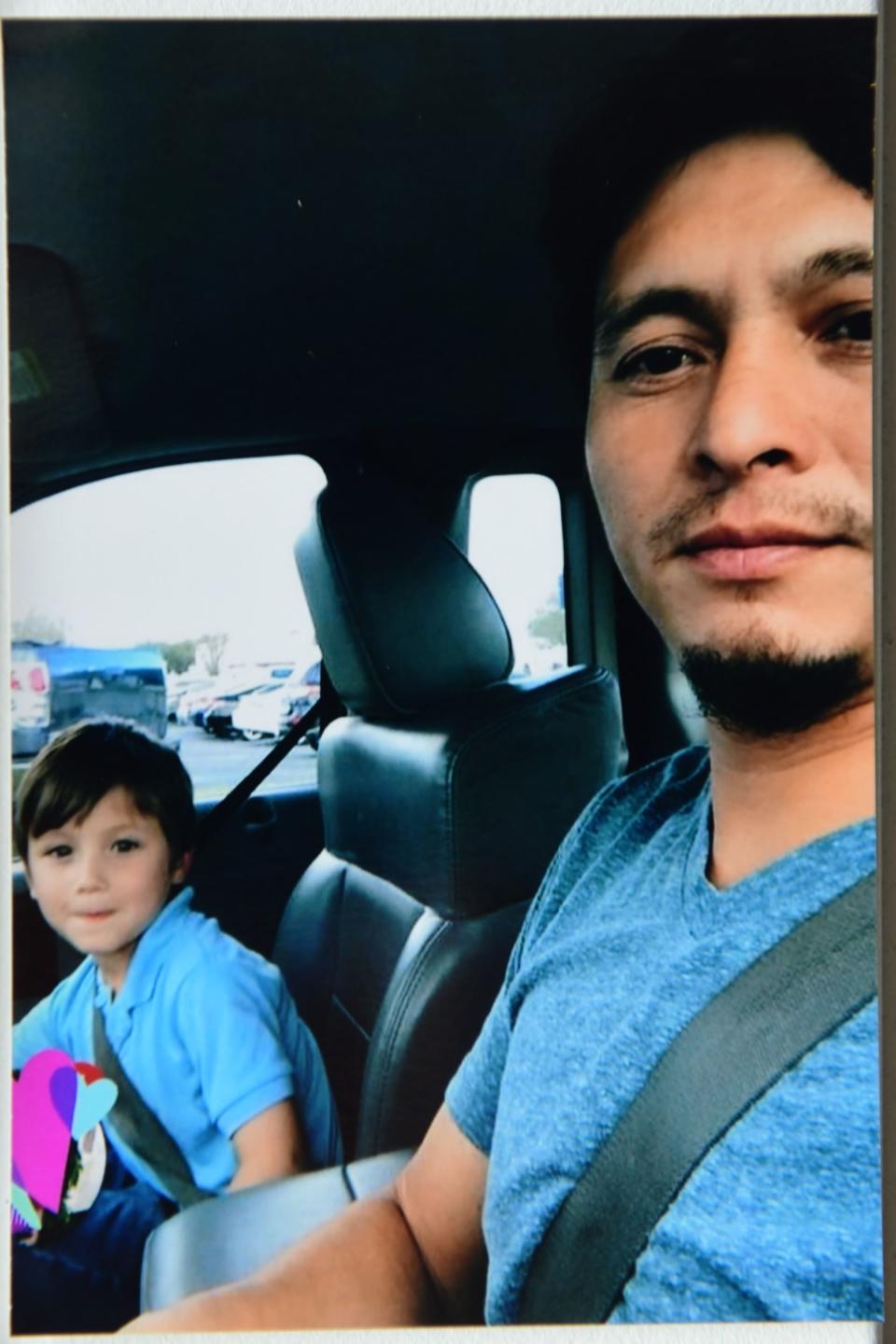Separated at the U.S.-Canada border: For a father and son, 90 miles is a distance too far

In 2019, federal agents took Carlos Rivera away in handcuffs when he strayed across the U.S.-Canada border, even though he says they could see his 7-year-old son waiting for him with a friend on the Canadian side.
U.S. officials then sent Rivera to his native Honduras rather than back across the border into Canada, where he had been granted asylum the previous year based on his being persecuted by gangs back in his homeland.
Through a series of confusing steps and missteps, Rivera is now back in British Columbia. But his son, Enrrique, is in foster care in Washington state, having been taken into custody himself after the friend took him across the border to plead with U.S. officials to reunite the two.
Washington state child-custody officials continue to delay their reunification in Canada, on Thursday telling a judge that criminal background checks were needed on Rivera and his fiancee, along with a home study on their apartment — even though agency regulations do not require such a study.
What's more, in a Kafka-esque twist, an agency caseworker asked the judge to make Rivera undergo a mental health assessment because of possible trauma involving the government separating him from the child and imprisoning him. Angelina Godoy, director of the Center for Human Rights at the University of Washington, found that recommendation exasperating.
"If they're concerned about his trauma, why don't they stop inflicting it upon him by returning his child?" asked Godoy, a UW professor of international studies.
Family separations continue stirring controversy along the U.S.-Mexico border, where Trump administration policies split more than 5,000 children from their parents. Child advocates and a task force established by President Biden are scrambling to reunite families, with several reunions occurring in recent days.

Godoy said she recently learned that some family separations have also occurred along the U.S.-Canada border, although she granted that the 16 possible cases she has found so far are a minuscule number compared with those along the southern border.
Yet "even one family separation is too many, as Carlos Rivera's case shows," she said.
In 1998, Carlos Enrrique Rivera Rocha was an 18-year-old with a sixth-grade education when Hurricane Mitch destroyed his family’s corn and bean farm, sending him penniless to the slums of Tegucigalpa. He said during a recent interview that he endured extortion and threats from gangs, eventually riding north on the tops of train cars and paying a smuggler to get him into the United States in 2005.
Rivera said he then found construction work in Louisiana, got married and started a family, but his wife took Enrrique and left him, later losing custody of the boy to the state of Mississippi. Court records show that even though Rivera was undocumented, state officials awarded him sole custody of his son.
In 2018, feeling that the Trump administration's hard-line immigration policies left him vulnerable to family separation, Rivera traveled with Enrrique to the northern border, applying for asylum in Canada and entering the country legally. He was granted asylum, and Enrrique entered first grade in Quebec.

Rivera said he renewed contacts with Itzel Alvarez, a childhood friend from Honduras living in California legally while applying for asylum. After the long-distance relationship turned romantic, she decided to try to join him in Canada, where she planned to follow his lead in applying for asylum.
Alvarez, however, learned that under a pact called the Canada-U.S. Safe Third Country Agreement, Canadian officials might well reject her entry at an official port of entry, according to Andrew Brouwer, an attorney in Ontario who has done pro bono work representing Rivera. Therefore, Brouwer said, she decided to cross the border about half a mile east of the entry point at Blaine, Wash.
On the evening of July 28, 2019, Rivera's friend Alberto Zuniga drove him and Enrrique south toward the border, while Alvarez rode north in a Lyft car. When she approached, Rivera got out of the car to help her with a suitcase.

"I told Enrrique, 'Stay here for a second, I'll be right back,'" he recalled saying. "But I didn't realize that she had not yet crossed into Canada, and when I walked toward her, I was in the United States."
U.S. Customs and Border Protection agents sped over, arrested him and sent him to the Northwest Detention Center in Tacoma, Wash.
Zuniga, who had remained with Enrrique on the Canadian side of the border, decided to walk with him through the official entry point into the U.S. There, Zuniga implored U.S. officials to send the boy's father back to Canada.
But turning to reenter Canada, where border guards let him through, he had no documentation to show that he was authorized to have custody of Enrrique. Therefore the child, a U.S. citizen, was put in the custody of the Washington State Department of Children, Youth and Families, which sent him to live with a foster family.
Court records show that in October 2019, an immigration judge ordered Rivera returned to Canada, but U.S. Immigration and Customs Enforcement flew him instead to Honduras.
Matt Adams, legal director of the Northwest Immigrant Rights Project, an advocacy organization in Seattle, said that although he was not familiar with Rivera's case, it appeared that ICE violated his rights. The agency would have been required by law to give him the chance to apply for asylum in the United States before sending him to Honduras, he said.
ICE officials referred a request for comment to Customs and Border Protection. Jason Givens, a spokesman for that agency, did not address the subject of Rivera's removal but said that CBP acted according to the law. He wrote in an email that Rivera broke the law when he entered the U.S. and that he told border agents he was trying to help his girlfriend illegally enter Canada.
"People found to have illegally entered the U.S. will be processed for immigration proceedings," Givens wrote.

Rivera returned to Canada, where he has worked from afar with attorney Christina King, a public defender in Washington state, to regain custody of Enrrique, who lives just 90 miles away. He said that he speaks by video a few times a week with Enrrique, who plays guitar and sings when the presence of a foster parent on the calls limits what his son feels he can say.
King said that employees of the state child protection agency are accustomed to cases in which parents are potentially abusive. They have insisted that criminal background checks be conducted on Rivera and Alvarez, who are now engaged and live together in Surrey, British Columbia, along with her 5-year-old daughter, Andrea. The agency also has maintained that a home study must be conducted by an approved Canadian company before Enrrique can be sent there.
"The whole purpose of the agency is supposed to be stopping trauma to children, but here it is causing so much more," King said.
Rivera told agency officials that his sister, who lives in Florida, was willing to take in Enrrique, but they said they couldn't send him there because she was undocumented. Asked in an interview whether undocumented status disqualified people from taking custody of a child, Nancy Gutierrez, the agency's interim communications director, replied in an email that immigrants with that status "can become caregivers."
Gutierrez, who declined to comment on a specific case, said that the law requires that background checks be conducted on residents in a parent's home before a dependent child can be returned there, but said that home studies are not always required.
On Thursday, a Whatcom County Superior Court jurist held a hearing to consider a motion for immediate return of Enrrique to his father filed by King, who provided FBI background checks conducted on Rivera and Alvarez last year.
Court Commissioner Leon Henley Jr. also considered a declaration by Angela Paull, the agency's social service specialist handling Enrrique's case, who asked him to impose other conditions, including the mental health assessment of Rivera "to support coping with his own trauma related to incarceration and family separation."

Henley declared that state officials had not shown that they had "proceeded expeditiously" to get background checks done. He ordered them to appear in court weekly to report on progress.
But he ruled that before Enrrique can rejoin his father, the background checks must be done.
Before announcing the decision, Henley addressed Rivera, who was attending the hearing online. He called the information that he had reviewed about the family separation "heartbreaking."
"I can only say that I am sorry that you've been without your son for so long," Henley said.
This story originally appeared in Los Angeles Times.

